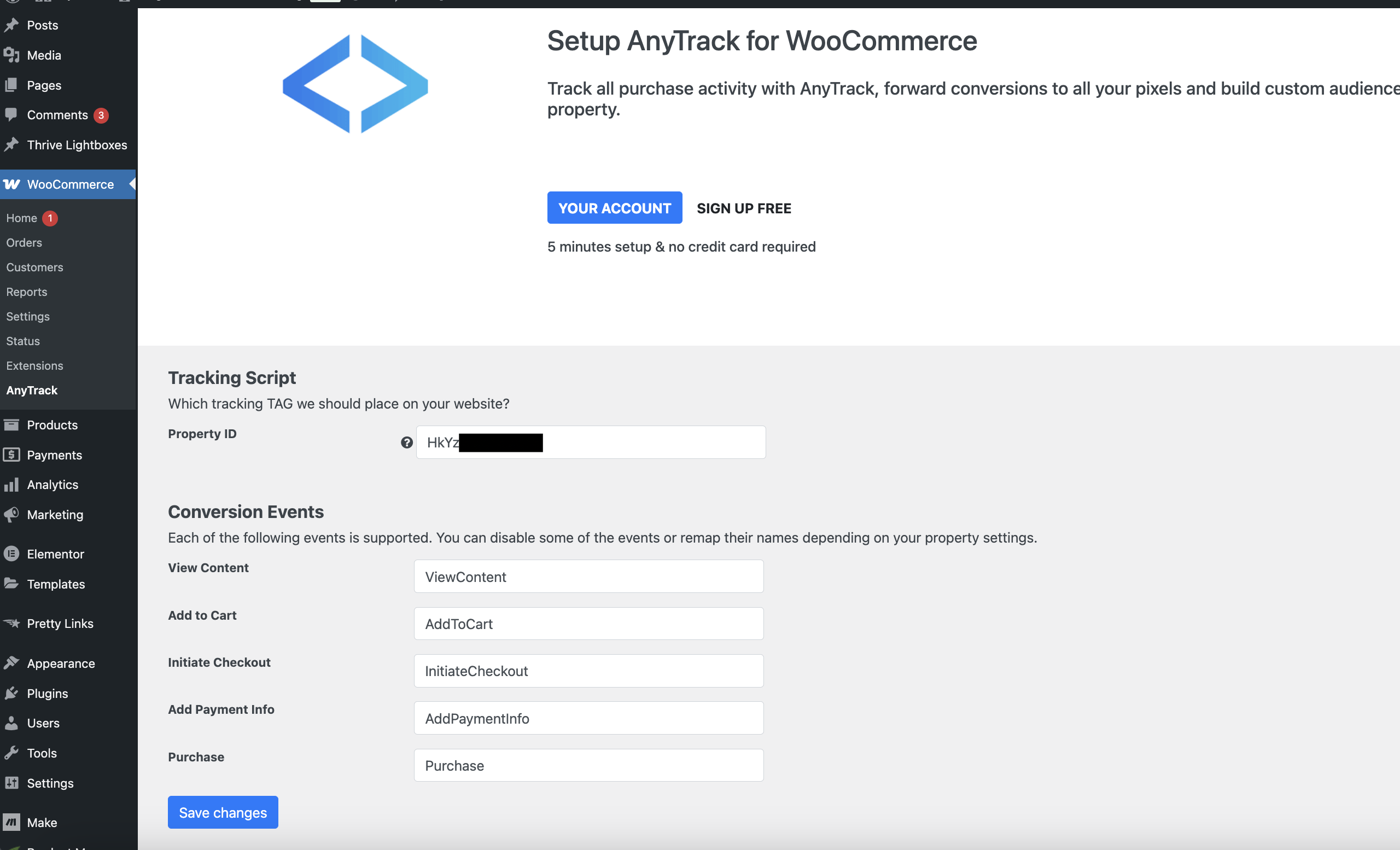WooCommerce Integration
Complete guide to integrating AnyTrack with WooCommerce for automated conversion tracking, real-time data sync, and optimized ad performance across Google Ads, Facebook Ads, and TikTok Ads.
Before you begin
- You have an active AnyTrack account
- You have admin access to your WordPress dashboard
- WooCommerce is installed and active on your site
- You can install and activate WordPress plugins
WooCommerce Integration Overview
The AnyTrack WooCommerce integration automatically syncs customer behavior data between your store and AnyTrack. Once connected, you can track and measure key customer actions like:
- Product page views
- Add-to-cart events
- Purchases and other conversions
AnyTrack sends this data automatically to your connected ad platforms (Google Ads, Facebook Ads, and TikTok Ads) via their Conversion APIs, so your campaigns optimize on real purchase data instead of modeled conversions.
What this integration does
- Sends accurate conversion data to ad platforms so they can optimize bidding and targeting.
- Tracks the full customer journey from click to purchase, across sessions and devices.
- Attributes revenue to the correct campaigns, ad groups, and creatives.
How does the WooCommerce AnyTrack integration work?
Here's the simple 4-step process that happens automatically:
-
Traffic Capture: When visitors arrive on your site, AnyTrack captures UTM parameters, referrer data, and first-party data.
-
Customer Journey Tracking: AnyTrack automatically monitors customer interactions such as product views, add-to-cart actions, and purchases.
-
Attribution Processing: Conversion data is processed and displayed in your AnyTrack dashboard reports.
-
Ad Platform Sync: AnyTrack sends conversion data to your advertising platforms via their Conversion APIs. This powers campaign optimization and audience targeting.
Technical Details
| Reference | Value | Information |
|---|---|---|
| Tracking Group | WooCommerce | Use this to activate the integration programmatically. |
| Subid Parameter | click_id | The click ID passed and stored in WooCommerce. |
| Integration Method | Plugin | The official AnyTrack plugin tracks both browser and server-side events. |
WooCommerce Standard Events and Conversions
| Event Name | Description | Data Source | Meta Ads Mapping |
|---|---|---|---|
ViewContent | A visitor views a product page | JS | ViewContent |
AddToCart | A visitor adds an item to the cart | JS | AddToCart |
InitiateCheckout | A visitor begins the checkout process | JS | InitiateCheckout |
AddPaymentInfo | A user enters payment information | Server | AddPaymentInfo |
Purchase | A user completes a purchase | Server | Purchase |
Upsell | A user orders a product set as Upsell through FunnelKit | Server | Upsell |
NoteThese events are automatically mapped to corresponding ad platform events to ensure accurate attribution.
The WooCommerce Plugin
The AnyTrack Plugin for WooCommerce lets you connect your store, track conversion events, and send them to your ad platforms through the AnyTrack Conversion API. If you need to install the Tracking Tag separately, the plugin handles this automatically.
Setup Guide
Step 1: Install the WooCommerce Plugin
Follow these steps to get started:
- Go to your WordPress Plugin page
- Add a New Plugin
- Search for AnyTrack
- Select AnyTrack for WooCommerce Plugin
- Click Install
- Click Activate
- Enter your AnyTrack Property ID in the plugin settings

ImportantDisable any other plugins that interact with ad platforms to prevent duplicate tracking.
Learn about AnyTrack deduplication methods.
📽️ Watch the integration tutorial on YouTube
Validate Your Integration
NoteInstall the AnyTrack Pixel Helper Chrome Extension to verify your Tracking Tag and check event data in real time.
Here's how to test that everything is working:
- Open your site in a private/incognito window
- Trigger some events (e.g.,
AddToCart,InitiateCheckout,Purchase) - Check your AnyTrack Conversion Report for event capture and attribution
WooCommerce Integration - Frequently Asked Questions
FAQ was last reviewed on 2026-03-05
Updated about 3 hours ago
